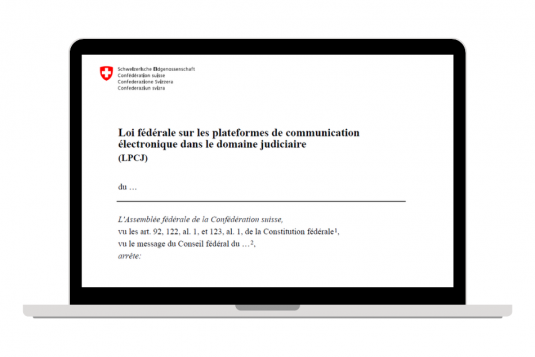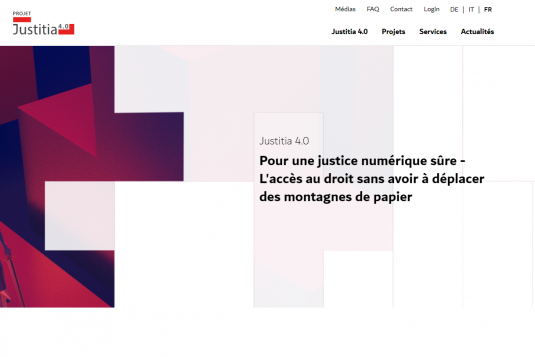The digital transition of the justice system in Switzerland concerns nearly 300 courts, cantonal and federal (first and second instance, civil, criminal and administrative branches), cantonal offices of the Public Prosecutor and the Public Prosecutor's Office of the Confederation, the Swiss Lawyers' Association and the cantonal Bar Associations.
The project
It presupposes the adoption of an appropriate legal framework, at both federal and cantonal levels. This transition also involves adapting the working procedures of the judicial authorities, their information systems, the workstations of the magistrates and collaborators as well as the courtrooms.
In terms of federal legislation, at the beginning of the year 2023, the Federal Council has submitted to the Federal Assembly, a draft federal act on the platform for electronic communication in the judicial field. The aim of this proposal is to establish the necessary framework conditions for electronic communication and consultation in the judicial sphere. It also contains the necessary amendments to federal procedural law. The cantons, for their part, will have to adapt cantonal law, in particular, the administrative procedural law.
The Conference of the justice system – which is made up of representatives of federal and cantonal judicial authorities – and the Conference of Cantonal Justice and Police Directors have also launched a national project called Justitia 4.0, to work together on the practical implementation of the digital transition of the justice system. In particular, the project aims to build a common platform for consultation and communication in the judicial field Justitia.Swiss.
The national project does not aim to achieve the digital transition of each judicial authority on its own. It is up to the cantons to implement the necessary projects to this end. The Geneva Judicial power is conducting an internal project called eDossier judiciaire, designed to adapt work processes, information systems, equipment, courtrooms and workstations for staff and magistrates.
The planning of the project is still provisional and will depend on the legislative work involved. Federal legislation will come into force in 2025 or 2026 at the earliest.
What does the draft federal act provide for?
The draft federal Act on the platform for electronic communication in the judicial field (APCJ) sets the framework conditions for electronic communication and consultation. It also adapts federal procedural law. Essentially, it provides for:
- The obligation of judicial authorities to keep judicial files in electronic form.
- The obligation of judicial authorities to communicate electronically with lawyers or other professionally qualified representatives.
- The obligation for lawyers and other professionally qualified representatives to communicate electronically with the judicial authorities, and also to consult court files in electronic form.
- The ability for natural and legal persons acting on their own to do the same.

Federal law provides for a transitional period of 2 years after the law comes into force, before the aforementioned obligations are imposed.
The cantons will adapt their administrative procedural law accordingly.
The platform Justitia.Swiss and the court file application
The project Justitia 4.0 is particularly concerned with the development of the secure platform Justitia.Swiss, which will enable electronic communication with judicial authorities, as well as online consultation of court files. Initiated at the end of 2022, the new project is currently underway. The Geneva Judicial power is contributing actively to this project.

The project Justitia 4.0 is also planning to make available a digital court file management application, which cantonal and federal judicial authorities will be able to acquire. In 2022, the Geneva Judicial power took part, alongside Berne and Aargau, in the feasibility study conducted by the national project.
The project Justitia 4.0 also proposes measures to support implementation of change to federal and cantonal judicial authorities. These measures form a central axis. They will need to be adapted and supplemented by a change management plan specific to the Geneva Judicial power.
The electronic court file "eDossier"
The project eDossier judiciaire is developed by the Judicial power to complete the digital transition of Geneva's justice system. It complements the national program, which is not intended to support the judicial and cantonal authorities in the concrete implementation of this reform.
The draft act on the investment for the project eDossier judiciaire, designed to finance the digital transition of the justice system in Geneva, was unanimously accepted by the working group Committee and then, by the Cantonal Parliament, on January 27, 2023.
In addition to Geneva's contribution to the project Justitia 4.0, the project’s credit voted by the Cantonal Parliament aims to finance the adaptation of:
- The Judicial power's information system, i.e. the redesign of existing applications, the integration of the future electronic judicial file application and their connection to the future national platform Justitia.Swiss,
- Workflows processes generated by the transition from paper to electronic court files,
- Software and equipment required for digitization,
- Workstations and courtrooms, in collaboration with the office cantonal des bâtiments,
- The infrastructure of the Office cantonal des systèmes d'information et du numérique, in particular, data storage capacity in anticipation of the transition to electronic court records.
It will also provide funding for:
- The transition to electronic archiving
- The digitization of ongoing legal proceedings and
- Measures to support change management.